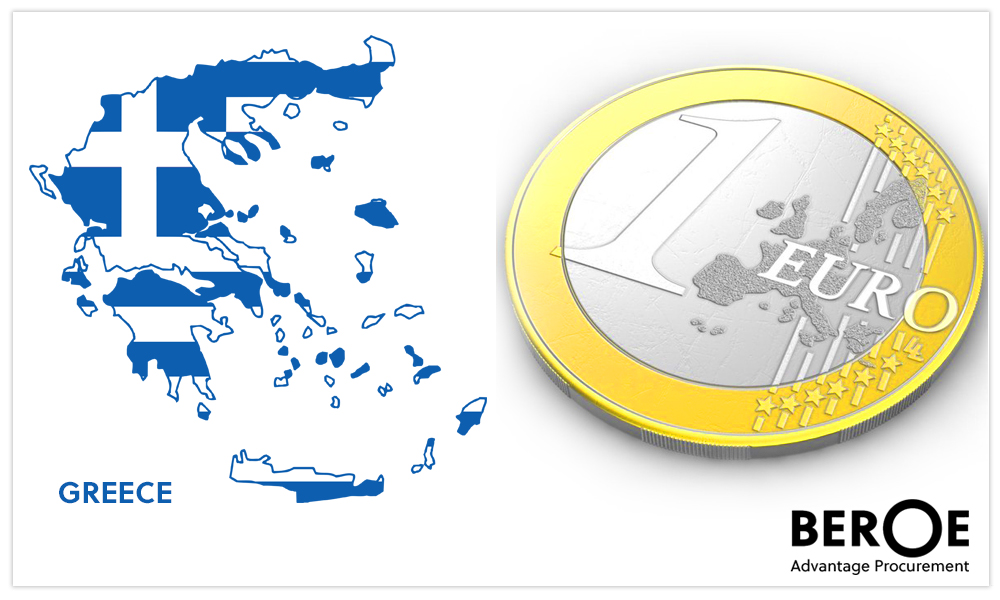
Procurement teams -- watch out for "Grexit"

The Euro zone debt crisis has turned a fresh chapter. Greece has closed its banks all this week (beginning June 29) and capped cash withdrawals from ATMs at 60 euro a day to stem cash outflow.
Polls conducted by various news outlets show that there is a good chance of "Grexit" - a neologism to denote Greece leaving the Euro currency bloc.
While politicians and bureaucrats try and salvage a deal ahead of the crucial referendum on July 5 in which Greeks will decide whether to stay in the euro zone or return to the Drachma, the entire business community around the world are assessing the possible impact of Greece opting to leave the Euro.
The Wall Street Journal reported that so far it is business as usual for global logistics companies United Parcel Service, Deutsche Post's DHL and TNT Express.
The paper said that DHL has put measures in place to ensure stable operations in Greece, including asking employees to fill up vehicles regularly in case of a fuel shortage, as well as monitoring credit terms for customs duties that must be paid on inbound shipments. (http://beroeinc.co/1Hs68rt)
Reuters reported that one of Europe's biggest dairies, FrieslandCampina had boosted stocks of condensed milk and infant formula in Greece in anticipation of hoarding by consumers.
Supply chains have gone global and any impact on Greece, which is a major transportation and logistics hub, can have a wide impact.
From a balance of trade point of view, the top exports of Greece are refined petroleum, packaged medicines, Aluminum plating, non-fillet fresh fish and raw cotton. And some of the top imports are: Crude oil, gas, passenger and cargo ships.
Greece is also famous for its olives, olive oil, cheese, wine and so on. Any foreign company importing these products can potentially face supply disruptions.
Turkey, Italy, Germany, Saudi Arabia and China are some of the top trading partners for Greece.
Several of Greece's importers and exporters, some of whom can also be suppliers to global companies, can potentially face cash crunch if capital controls invoked by the government continues for a longer period. And in case the country goes the Drachma way then the whole affair can be messy. This can have a wider impact across the supply chain.
Procurement teams who deal with Greece-based suppliers will have to draw up contingency plans to minimize any impact:
1) Exploring alternate sourcing destinations, preferably from nearby countries
2) Refrain from signing long-term deals in case supply contracts are coming up for renewal in the next few weeks. Until the debt dust settles down it is better to deal with suppliers on a short-term basis
3) Try signing forward contracts with suppliers from alternate regions, especially if the raw material or service is critical to one's business.
4) In case Greece opts for Drachma then it's better to do invoicing in Euros as the exchange rate can be volatile in initial days.
And multinational companies who sell their products and services in Greece will have to wait for the situation to play out. In some instances, they may not get paid by Greek companies who may face cash crunch due to capital controls or in the event of the economy switching over to Drachma. Medical supplies, for instance, are in danger of being disrupted and Reuters reported last month that drug companies were owed more than 1.1 billion euros ($1.2 billion) by Greek hospitals and the state-run health insurer EOPYY, after not being paid since December.(http://beroeinc.co/1JogBni)
To be sure, economic history is replete with financial crisis; and though they brought about painful consequences, the wheels of business never came to a screeching halt. In keeping with tradition: Greek crisis too shall pass. However, it helps to be vigilant.
UPDATED ON SEPT 25, 2015: Greek voters gave Alexis Tsipras and his Syriza party the benefit of the doubt over a dramatic summer U-turn, when he ditched his anti-austerity platform to secure a new bailout and avert 'Grexit', a Greek exit from the euro zone. (http://beroeinc.co/1LC7Zw6)
Related Insights:
View All
Get more stories like this
Subscirbe for more news,updates and insights from Beroe







